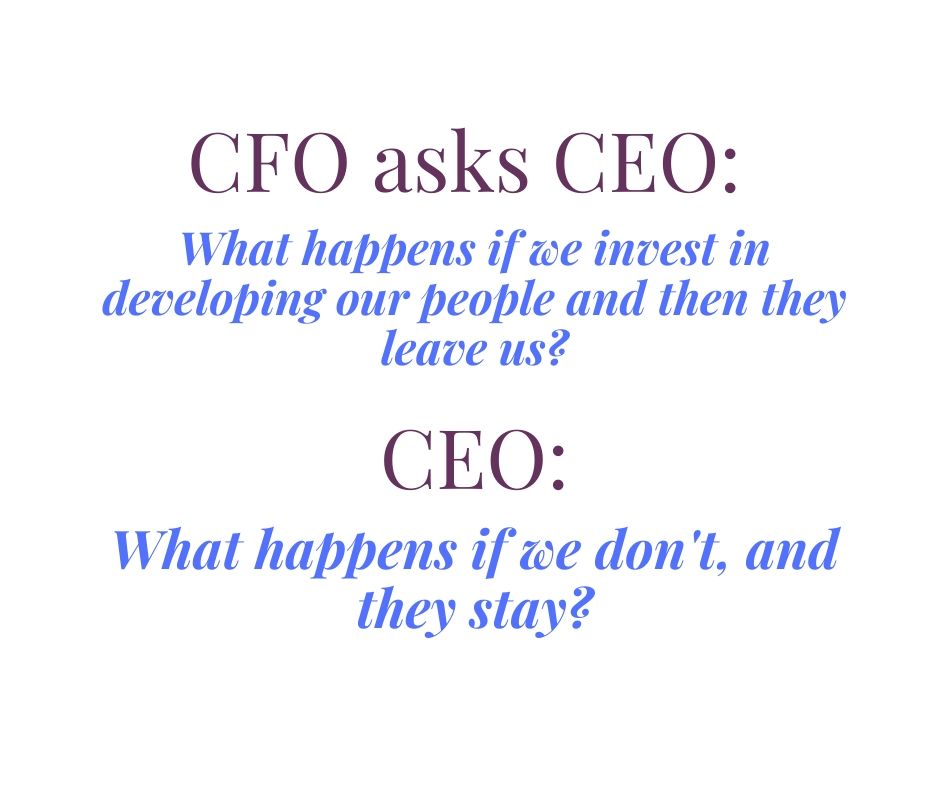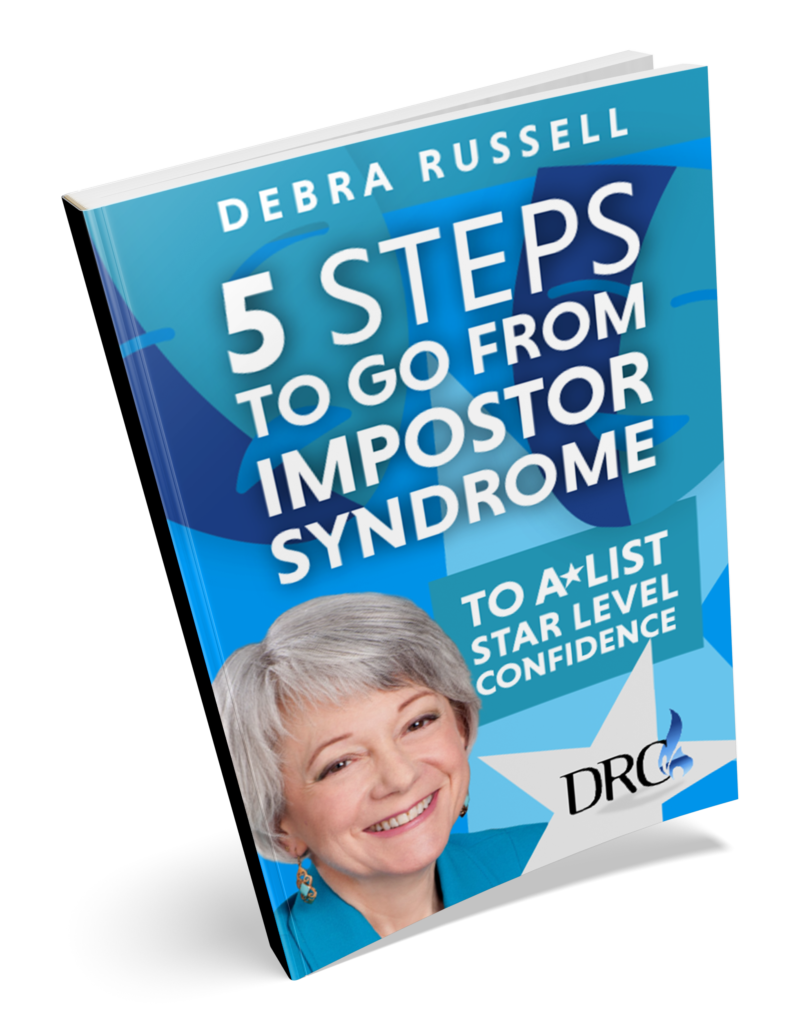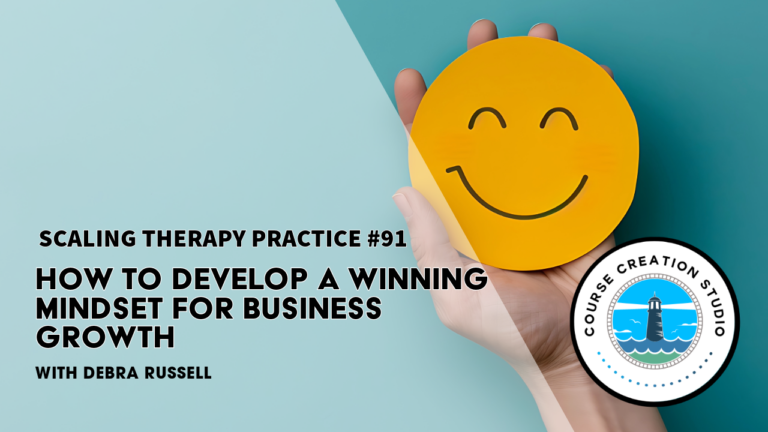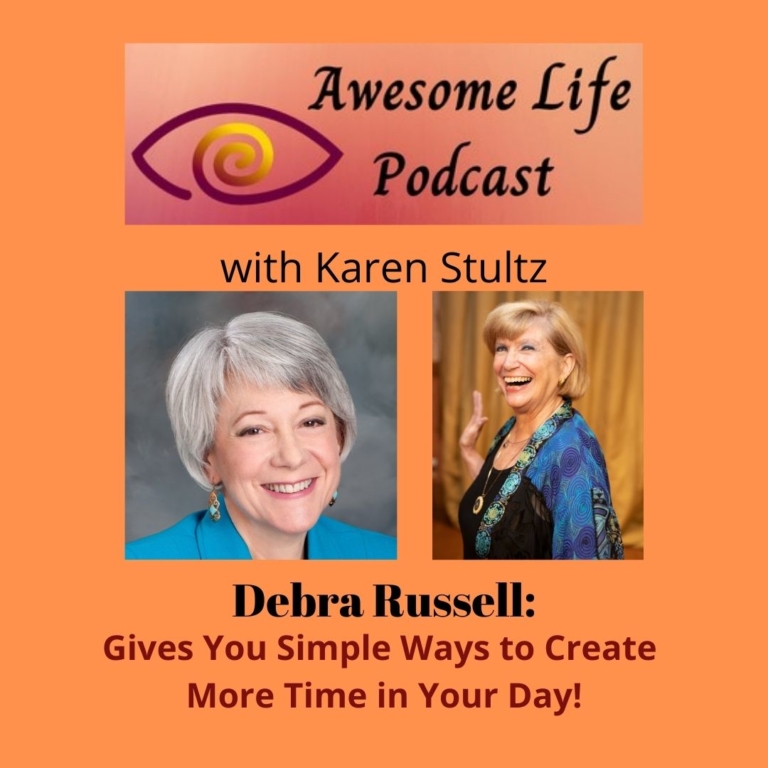What is Professional Development?
According to BusinessDictionary.com, Professional Development is:
Process of improving and increasing [your] capabilities
of staffthrough access to education and training opportunities in the workplace, through outside organization, or through watching others perform the job.[Edits are my own]
Why Invest in Professional Development for Yourself and Your Staff?
So, I’m not going to talk about ROI or the research. Because, really – is that how you’re going to decide if you’re worth investing in?
Here’s the bottom line – the more you invest in yourself as a business owner, the stronger you will be as a business owner.
The more you invest in your team’s development, the stronger they will be as a team AND the more committed they will feel towards you and your business. Because you are showing your commitment to their success.
The better you function as a human being,
- The better your results will be,
- The happier you will be,
- And the happier the people around you will be (including family as well as staff).
“And that’s all well and good,” you might be thinking, “But I need a real reason to spend my limited resources on this professional development stuff!”
Have you ever heard the the concept:
Luck = Preparedness + Opportunity
You have limited power when it comes to Opportunities, right? But what you have ultimate power over is your own preparation. In my experience, people often don’t even see or credit the opportunities around them, because they aren’t actually ready to take advantage of them. They aren’t prepared.
The essence of business development IS becoming prepared. So that not only do you see the abundant opportunities around you, but you have the confidence to act on them when you see them. And you have the trust in yourself to create new opportunities even when you don’t see them!
Psssst….
Click here if you’d like to learn about Professional Development for Athletes and click here if you’d like to learn about Professional Development for Artists
The 3 Types of Professional Development
For some careers, continuing education is required to maintain your credentials/licenses. Also called CEUs (Continuing Education Units) or CECs (Continuing Education Credit), these programs generally focus on training directly related to your particular profession – skills that allow you to increase the quality or quantity of your services.
A lawyer learns about a particular aspect of the law. An accountant expands her knowledge of accounting for non-profits. A musician studies a new music style or a new instrument. You get the idea.
But is that enough? I believe that in order to be truly successful both in your business/career and in your life, you need to invest in 3 areas of professional development.
- Professional Skills
- Foundational Life and Business Skills
- Success Skills
I believe every business owner is best served when they embrace a context of “Always be learning,” and focus on all three areas. (Not necessarily at the same time!)
[/av_textblock]
[av_textblock size=” font_color=” color=” av-medium-font-size=” av-small-font-size=” av-mini-font-size=” av_uid=’av-k4zzr10a’ custom_class=” admin_preview_bg=”]
Professional Skills
Have you taken classes to become better at what you do? To learn additional skills in your area of expertise?
I’m not going to list categories for this area, because it will completely depend on what your profession is! Most adults have at one time or another expanded their toolbox, if you will, by learning a new skill to better serve their customers, clients and fans.
And when you think about professional development, I’m betting this is what you are generally thinking about. And it is important!
Not only do you always want to be developing your personal skill levels. It’s also important in this rapidly changing world to keep up with new developments in your field. Because if you don’t, there will be others, your competition, who do and they will outstrip you!
Unfortunately, this is where most business owners stop in their thinking about ongoing training. Being a successful business owner, whether it’s just you or you have a staff of thousands, requires your facility with skills in several areas that have nothing to do with the product or service you provide.
Read on to find out what these additional skills might be…
Life and Business Skills
These are the skills that allow you to successfully function in the workplace and in the world. This is a partial list of what might be included in this category.
Life Skills:
- Time Management
- Money Management
- Task Management (one aspect of time management)
- Organization of your environment
- Communication Skills (including boundary setting and building rapport)
- Leadership
Foundational Business Skills:
- Marketing and Sales
- Business Finances
- Communication, Negotiation and Public Speaking
- Project Management and Planning
- Building and Managing Teams and Delegation
- Networking and Follow-up
- Developing Systems for Your Business Operations
Some of these skills, like time management and organization, are what I consider meta level skills. When your time management, organization and financial management don’t work, nothing else really does either. In my coaching, I’m constantly amazed at how often clearing up issues around time, space and money have an impact much bigger than either me or the client expects.
Because they’re meta – and they affect everything.
Success Skills
Success skills are those softer skills that have to do with who you are deep inside and how you engage with your world. This can seem a bit woo woo, I know, and perhaps seem to be more in the “therapy” category.
And yet, as a business coach, I promise you that private clients benefit tremendously in their businesses and in their lives when they commit to expanding their success skills.
So, what are some of these success skills?
- Focus and emotion management
- Courage and bravery
- Confidence and believing in yourself
- Critical thinking
- Responsibility
- Persistence and resilience
- Self-motivation and momentum
Most of these fall under the larger heading of emotional intelligence. EQ is a complex subject, so I won’t get into it here. But suffice it to say, research has shown that above a certain minimum of IQ, EQ is actually more predictive of success both personally and professionally.
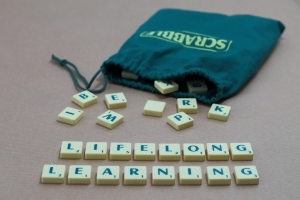 Finally, you can buy a class through a dozen (or more) online sources. You can take the class and you’ll probably learn some stuff. In my experience, however, taking a class rarely significantly changes things in the reality of your business.
Finally, you can buy a class through a dozen (or more) online sources. You can take the class and you’ll probably learn some stuff. In my experience, however, taking a class rarely significantly changes things in the reality of your business.
Why not?
Because if you don’t implement that learning into your business immediately, it will be gone. As the Curve of Forgetting graphically shows, humans don’t retain new information unless it’s put into use within 48 hours!
Don’t get me wrong – classes are great! In fact, if you clicked through on any of the links above, you’ll see that most of them are classes that I teach for the ArtistsMBA program. Acquiring new information in areas that you would like to strengthen is important. AND if you don’t have support to implement that information in a regular way, your business will likely not benefit.
For this reason, I recommend coaching, whether privately or in a group setting, to support you in actually taking clear specific action to implement the learning on a consistent basis, and hold you accountable for following through.
I offer professional development training in 3 formats – the Artists Marketing & Business Academy (online podcast format classes, and not just for artists anymore!), the Marketing & Business Academy Mastery Lab (group coaching) and Private Coaching. Please feel free to reach out if you are looking to expand your skills and increase your success.

